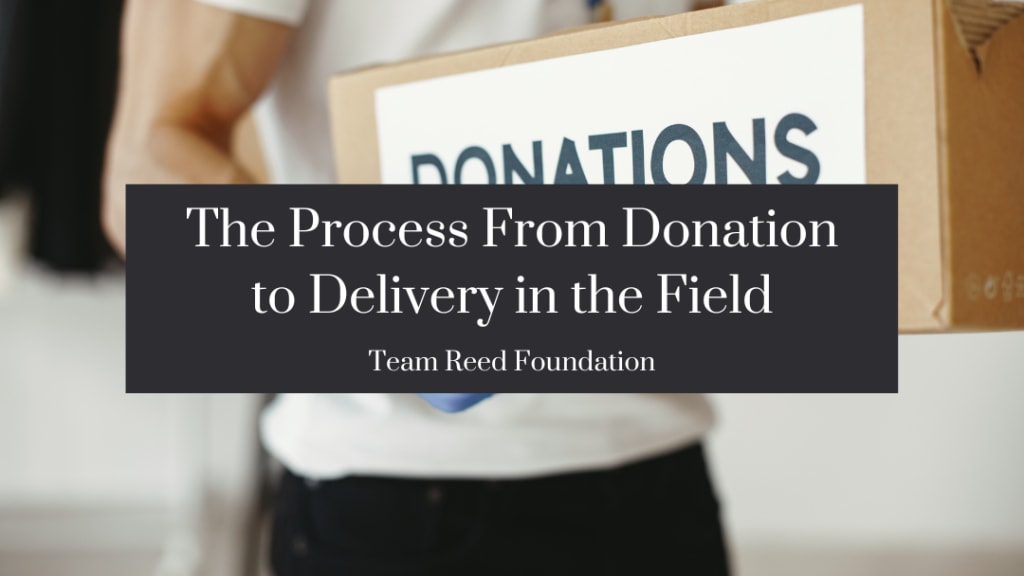The Process From Donation to Delivery in the Field
Have you ever wondered where your donation is going or how it is being used? This blog shares the process from donation to delivery in the field.

Charities are crucial in addressing the world’s most pressing issues, from poverty and hunger to education and healthcare. One of the most important aspects of any charity’s work is getting donations to those who need them most. In this blog, we will explore the process from donation to delivery in the field for a typical charity and the challenges and considerations that come with each step.
RECEIVING THE DONATION
The first step in the process is receiving donations. Donations can include financial contributions, goods, or time and expertise. For financial donations, charities typically have various options for donors to give, including online donations, direct mail campaigns, and fundraising events. For donations of goods, charities may have specific guidelines for what can be accepted and may have a process for screening and sorting donations to ensure that they are appropriate for the needs of those in the field. For donations of time and expertise, charities may have volunteer programs or partnerships with organizations that can provide support in a particular area.
ALLOCATION AND PLANNING
Once donations are received, the next step is to allocate resources and plan for delivery in the field. This can include everything from purchasing supplies and equipment to hiring staff and partnering with local organizations. Charities may also conduct needs assessments to determine the greatest needs and how best to allocate resources to meet those needs.
The next step is to transport donations and resources to the field. This can involve a range of logistical challenges, from coordinating transportation and shipping to navigating customs and border regulations. Occasionally, charities may partner with local organizations or hire local staff to help with transportation and delivery.
DISTRIBUTION
Once donations and resources are in the field, distributing them to those in need is the next step. This can involve working with local organizations and community leaders to identify the most in need and ensure that resources are distributed fairly and equitably. Charities may also have processes in place for monitoring and evaluating the impact of their work in the field to ensure that resources are being used effectively and efficiently.
USING RESOURCES EFFECTIVELY
One of the biggest challenges in the process from donation to delivery in the field is ensuring that resources are used effectively and efficiently. This requires careful planning and monitoring and a willingness to adapt and adjust strategies. Charities may also face challenges in terms of security and safety, particularly in areas of conflict or instability.
UNDERSTANDING LOCAL COMMUNITIES’ NEEDS
Another challenge is ensuring that donations are culturally appropriate and sensitive to local customs and traditions. This requires a deep understanding of local communities and their needs and a willingness to work collaboratively with local organizations and community leaders.
CONCLUSION
In conclusion, the process from donation to delivery in the field for a charity involves a range of complex and interconnected steps, each with its challenges and considerations. From receiving donations and allocating resources to transporting donations and distributing them to those in need, charities must navigate a range of logistical, cultural, and ethical considerations to impact the world positively. By working collaboratively with local organizations and community leaders and maintaining a commitment to transparency, accountability, and impact, charities can make a meaningful difference in the lives of those they serve.
About the Team Reed Foundation
The Team Reed Foundation is a 501(c)-3 donor-advised fund and currently works with the Greater Houston Community Foundation (GHFC) to help donate time and funds to Houston communities and its residents. The Team Reed Foundation donates to St. Benedict’s Homeless Shelter in Owensboro, Kentucky, the Ronald McDonald Foundation, Fischer House, Duke Center of Cancer Research, and the American Junior Golf Association.
The Team Reed Foundation is currently focusing on smaller charities that are in desperate need to help improve people’s lives, along with impacting local and national charities to change people’s lives. Team Reed hopes to build this foundation to help serve people and give back to those in need locally, nationally, and worldwide.
About the Creator
Patrick Reed
Hailing from Houston, Texas, Patrick Reed is a professional golfer who plays on the PGA Tour and the European Tour.






Comments
There are no comments for this story
Be the first to respond and start the conversation.